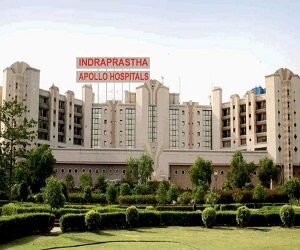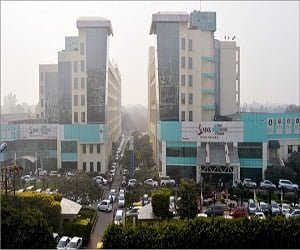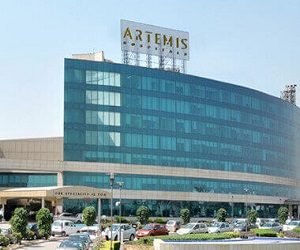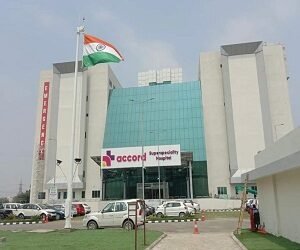Multiple Sclerosis Treatment in India
Multiple sclerosis is an autoimmune disease which further affects the brain, spinal cord, and optic nerves. It’s normally characterized by a selection of neurological disorders and slow disabilities. The illness develops when the body’s immune system begins to attack the myelin sheath that’s the insulating cover that surrounds the nerve pathways. The neural damage leads to disturbance of different functions of the nervous system. The damaged cells are scarred in numerous places and look like lesions, and this also provides the disease its name — Multiple sclerosis (MS). Multiple sclerosis treatment cost in India is the most common autoimmune nervous system disease and a major cause of impairment in children. People over the age group of 20 to 40 are more commonly diagnosed with MS and that is when the very first symptoms generally appear.
Get Opinion From Doctor
Types of Multiple Sclerosis:
Each individual is affected by multiple sclerosis in another way and it isn’t easy to forecast the course of illness. National Multiple Sclerosis Society along with the International Advisory Committee on Clinical Trials of MS at 2013 clarifies 4 basic Kinds of MS, specifically ::
Clinically isolated syndrome (CIS): During this, the first signs of MS appear on account of this damage and demyelination of these neural fibers. The inflammation triggers a run of characteristic indications of the neurological disorder and also the incident usually persists for 24 hours, however, these don’t fulfill the standards for identification of Multiple sclerosis.
Relapsing-remitting Multiple Sclerosis (RRMS): These are followed by a period of months to years without any fresh indicators or strikes that might look like partial or complete healing, known as remitting. The majority (around 80 percent ) of Multiple Sclerosis cases are diagnosed in this stage.
Secondary advanced Multiple Sclerosis (SPMS): Majority of individuals with Relapsing-remitting Multiple Sclerosis with time, progress to Secondary progressive Multiple Sclerosis — where there’s a continuous progression or worsening of neurological issues. It may be with or without relapse of these symptoms and might have no clear period of healing or development of symptoms (remitting).
Main advanced Multiple Sclerosis(PPMS): 10- 20 percent of Multiple Sclerosis instances develop Main progressive Multiple Sclerosis, indicated with a continuous worsening of neurological acts by the beginning of symptoms as well as without relapses or remissions.
Signs & Symptoms of Multiple Sclerosis: The indications of Sclerosis treatment in India might differ from person to person, based on the kind and severity of disease as well as the sorts of neurological damage. A variety of issues associated with vision, motion, swallowing and speech, sensory, and motor functions, can happen in multiple SclerosisMS).
A number of the particular symptoms include:
- Fatigue or muscular fatigue
- Uncoordinated movement and difficulty in walking
- Double vision, blurry vision or blindness in 1 eye
- Bladder control difficulties
- reduction of feeling, numbness or tingling sensation
- Stiffness and spasms in muscles
- Uncoordinated movement and issues with balance
- Problem with the cognitive procedure — believing, coordinating, planning etc.
- Emotional issues such as depression, stress, etc.
- Difficulty in sexual reaction
Based on the sort of Multiple Sclerosis, the signs may vary and might come and go in kind of strikes or worsen as the disease progresses and there might be irreversible harm.
Helpful – Relevant questions to ask before you go for a NeuroSurgery
Causes of Multiple Sclerosis:
While the reason for Multiple Sclerosis isn’t known, however, it’s thought to be connected to hereditary predisposition, immune system abnormalities, and ecological elements. The risk factors can include:
Genetics: Family background could be connected to Multiple Sclerosis because it is discovered that you’re in a greater chance of developing multiple sclerosis if a relative is getting it. Even though it isn’t thought to be a hereditary illness, certain genes have been related to the disease that may raise the likelihood of developing the illness.
Diseases: Certain viruses are linked to multiple sclerosis, for example, Epstein-Barr virus, which causes infectious mononucleosis. Individuals who’ve been infected by this virus are far more at risk of developing multiple sclerosis compared to individuals who have never been infected.
Geography: Multiple Sclerosis is much more prevalent in people residing in Northern Europe and other regions that are from the equator whereas the one from Asia, Africa, or Native America has the lowest risk.
Immune Disorders: Individuals with thyroid disease, type 1 diabetes, inflammatory bowel disease, and some others can also be at a relatively higher chance of Multiple sclerosis.
Smoking: Smoking can be a risk factor for Multiple Sclerosis, particularly in those people who have undergone the first episode of symptoms such as Multiple Sclerosis.
Diagnosis of Multiple Sclerosis Treatment:
Multiple Sclerosis is most frequently diagnosed in people in the old classes of 20-30, but it’s necessary to remember it may develop at any age. There’s not any single definitive evaluation, as of yet, to learn whether an individual has Multiple Sclerosis.
Cerebrospinal fluid evaluation: This is done in order to check for oligoclonal bands and other materials that might indicate chronic inflammation of the nervous system.
Blood evaluation: No particular blood test for MS, however, it’s used to rule out other causes.
The plan is to rule out other potential causes of the disease and assess if the signs and test results meet the standards for diagnosing fulfill Multiple Sclerosis.
Get Opinion From Doctor
Different Types of Multiple Sclerosis Treatment in India:
Although there’s absolutely no complete cure for Multiple sclerosis, specific remedies are available to handle the symptoms from the individual and deal with disability.
The therapy is focused on slowing down the disease progression, raising the remittance period (no neurological episodes), and which makes the symptoms manageable.
The disease-modifying remedies or drugs are the long-term remedy for MS but can’t heal the illness itself but only assist in slowing the development and preventing new attacks. For short-term treatment — just to alleviate symptoms, drugs like corticosteroids are proven to work.
Disease-modifying Remedy:
The disease-modifying drugs stop symptom flare-ups and delay the progress of the illness. The injectable medicine comprises:
Beta-interferons: All these are the most frequently prescribed drugs for the treatment of MS. They decrease the frequency and severity of relapses or flare-up of symptoms.
Glatiramer acetate: This medication helps by blocking the attack myelin sheath from the human body’s immune system. This is injected under the skin.
The negative effect of using injectable drugs is that they could lead to skin irritation at the injection website.
Oral medicine for Multiple Sclerosis:
These medications are taken orally by the individual according to the physician’s prescribed dose and can assist in reducing relapses.
- Siponimod
- Dimethyl fumarate
- Teriflunomide
- For RRMS in children (10-17) drugs, there’s just one accepted disease-modifying treatment.

Infusion based drugs for Multiple Sclerosis:
The extract drugs are given directly into the veins from the physician once in a month or two.
These include Natalizumab and ocrelizumab (MSOcrevus™): the approved medication for primary-progressive. These medications are utilized when others do not get the job done.
Mitoxantrone is provided in the event of secondary-progressive MS and has essentially been chemotherapeutic drugs used for the treatment of cancer.
Adverse consequences of utilizing drugs:
The issue with disease-modifying medication is that the adverse effects linked to significant CNS and cardiovascular disease, and prolonged use may cause life-threatening ailments. Some more negative effects such as liver damage, infertility, acute myeloid leukemia, etc., have also been noticed.
Get Opinion From Doctor
Treatment of Infection:
A vast array of drugs can also be available to handle the signs and change based on the type of symptoms.
Corticosteroids: Many commonly used steroids such as MS could be given orally in addition to intravenously. These can decrease nerve inflammation and handle the flare-ups.
Plasma exchange (plasmapheresis): It’s used when steroids do not work. The liquid portion of the blood is eliminated and separated from blood cells. The blood cells have been sent straight back into the body following mixing with protein options called albumin. Plasma exchange can be utilized if your symptoms are fresh, acute, and have not responded to steroids.
Handling MS Symptom and Signs:
Physical therapy helps in strengthening and enhancing the overall muscle tone. The stretching and exercises with the support of mobility devices might help handle leg fatigue and make it much easier to carry out daily tasks.
Medicines for Handling Symptoms :
- Muscle relaxants: assist with muscular stiffness or spasms
- Infection and fatigue
- Depression: Antidepressants are utilized
- Bladder problems
- Medication to raise walking pace in MS patients
- Neuro-rehabilitation, counseling, and exercising is suggested for enhancing the signs and impairment.
Lifestyle Changes:
- Obtaining good sleep and a great deal of rest is critical.
- Regular exercise: It’s advocated as exercise might help improve muscular strength, coordination, and balance.
- Avoid warmth as multiple sclerosis symptoms can worsen in certain individuals as the body temperature increases. Employing a cooling apparatus can prove to be useful.
- Balanced diet plan A healthy and nutritious diet ought to be taken. Based on researches, vitamin D might have certain advantages for individuals dealing with Multiple sclerosis.
- Handle stress. Anxiety may be the cause behind symptoms or might worsen the present ones. Meditation, deep breathing, and similar activities that help you unwind are indicated.
- Reach out to our experts for the best and affordable Multiple Sclerosis Treatment Cost in India.
Q. Just how much can Multiple Sclerosis Treatment price in India?
A: The Multiple Sclerosis treatment price from India for Autologous Hematopoietic Stem cell transplant is 17,000 — 22,000 USD.
Q. What are the most common symptoms of MS?
A: Even though symptoms of MS are largely unpredictable and change for every single individual, they generally incorporate the sensation of numbness and tingling, fatigue, blurry or double vision, imbalance, poor coordination, depression, and difficulty with concentration and memory. The indicators can change over time or disappear/remit entirely, or they may persist and worsen as the disorder progresses.
Q. Is MS a life-threatening illness?
A: With timely and appropriate treatment, many MS sufferers can have a complete life with a fantastic life expectancy. A few patients might experience the fast progressive kind of MS, which might lead to a more serious health issue from a young stage. Some patients, particularly people that are significantly inactive, might experience some normal complications because of a prolonged chronic illness, such as pneumonia or disease.
Research studies have revealed that people with relapsing forms of MS when to start therapy at an early phase with a disease-modifying treatment and other therapy choices might have a longer lifetime than people who don’t undergo treatment.
Q. Could MS be inherited or contagious spread?
A: No, MS isn’t directly inherited or infectious. Genetic and specific environmental factors might increase the possibility of this illness.
Q. Could MS be totally cured?
A: MS doesn’t have a certain cure yet, however, the available remedies options aim to relieve the illness symptoms, enhance patients’ quality of life, and improve life expectancy.
Helpful – Multiple Sclerosis Treatment
Q. What’s ALS distinct from MS?
A: Amyotrophic lateral sclerosis (ALS) and Multiple sclerosis (MS) are two distinct kinds of disorders that have some common characteristics and symptoms.
The vital difference between the two is that MS is an autoimmune disorder where the immune system begins attacking the body itself, while ALS is a neurological disease where the neural cells from the brain and spinal cord start to devour away. These two diseases have been treated in another method.
Get Opinion From Doctor
We offers these Services
- Providing a doctor’s opinion and proper quotation
- Selecting the best hospital and doctor as per your case
- Arranging a call with the doctor (if the case required)
- Visa assistance, Providing Visa Invitation Letter (VIL)
- Providing full guidance how to get Visa from your country
- Providing total cost including treatment, air tickets, accommodation, and food
- Assitance to book flight ticket from your country
- Arranging airport pick up/ drop
- Providing professional language interpreter
- Booking accommodation and guest house as per your budget/ prefrence
- Providing help in money exchanging
- Providing local sim card
- Arranging video consultation with specialist doctor if case requires
Max Super Specialist Hospital Saket
Number of beds: 500
ICU Beds: 267
Airport Distance: 13 KM
Brief About:
- Max Super Speciality Hospital at Saket is one of the topmost healthcare service
- Providers in India. The multi-super speciality hospital has a capacity of over 500 beds, 250 functional beds. It is equipped with state-of-the-art facilities, advanced technologies.
- With the help of over 300 leading specialist Doctors, strong nursing staff, and state-of-the-art innovative medical tools.
Indraprastha Apollo Hospital
No. of beds: 900
ICU Beds: 262
Airport: 20kms
Brief About:
- Indraprastha Apollo Hospital is a flagship hospital of India’s foremost healthcare groups,the Apollo Group. It is a highly renowned multi-speciality facility that offers tertiary and quaternary care services to domestic and international patients.
- The 900 bedded hospital is outfitted with the most modern technology for diagnostics as well as therapeutic purposes.
- A team of highly trained medical professionals work under all the 52 specialities at the hospital.
Max Super Specialist Hospital Saket
Number of beds: 500
ICU Beds: 267
Airport Distance: 13 KM
Brief About:
- Max Super Speciality Hospital at Saket is one of the topmost healthcare service
- Providers in India. The multi-super speciality hospital has a capacity of over 500 beds, 250 functional beds. It is equipped with state-of-the-art facilities, advanced technologies.
- With the help of over 300 leading specialist Doctors, strong nursing staff, and state-of-the-art innovative medical tools.
Artemis Hospital Gurgaon
Number of beds: 600
ICU Beds: 185
Airport Distance: 19 Km
Brief About:
- Artemis Hospital, established in 2007, spread across 9 acres, is a 600plus bed; state-of-the-art multi-speciality hospital located in Gurgaon, India.
- Artemis Hospital is the first JCI and NABH accredited hospital in Gurgaon.
- Designed as one of the most advanced hospitals in India, Artemis provides a depth of expertise in the spectrum of advanced medical & surgical interventions, a comprehensive mix of inpatient and outpatient services.
Get Opinion From Doctor
We offers these Services
- Providing a doctor’s opinion and proper quotation
- Selecting the best hospital and doctor as per your case
- Arranging a call with the doctor (if the case required)
- Visa assistance, Providing Visa Invitation Letter (VIL)
- Providing full guidance how to get Visa from your country
- Providing total cost including treatment, air tickets, accommodation, and food
- Assitance to book flight ticket from your country
- Arranging airport pick up/ drop
- Providing professional language interpreter
- Booking accommodation and guest house as per your budget/ prefrence
- Providing help in money exchanging
- Providing local sim card
- Arranging video consultation with specialist doctor if case requires

Medanta The Medicity Hospital
Number of beds: 1250
ICU Beds: 300
Airport Distance: 18 KMs
Brief About:
- Medanta – The Medicity is amongst India’s largest and most renowned multi-super speciality healthcare centre with 1250 beds, 29 super speciality units and more than 800 accomplished doctors.
- Supported by state-of-art infrastructure, all the departments in the hospital are fully equipped with cutting-edge technology, modular Operation Theatre and modernized monitoring systems in ICUs.
- The panel of doctors from Medanta, headed by A.S.Soin performed the first successful intestinal transplant in India.
Fortis Memorial Research Institute
Number of beds: 1000
ICU Beds: 298
Airport Distance: 17 KMs
Brief About:
- Fortis Memorial Research Institute was established in 2001.
- It is an outstanding multi-speciality quaternary care hospital,having the top-notch infrastructure, advanced equipment, highly qualified and experienced medical professionals and super sub-specialists.
- Fortis Hosptial Gurgaon is an advanced centre of excellence in Robotic Surgery, Neurosciences, Oncology, Renal Sciences, BMT, Organ Transplants, Orthopaedics, Cardiac Sciences and Obstetrics & Gynaecology.
Sanar International Hospital
Number of beds: 130
ICU Beds: 35
Airport Distance: 20 Km
About Hospital:
- Sanar International Hospital was established in 2018.
- Sanar International Hospital founded by Mr. Naresh Kapoor.
- Sanar International Hospital offers comprehensive advanced surgical care in specialties like Cancer, Heart, Blood and Marrow Transplant, Lung, Liver, and Neurosciences along with other major departments with advanced state-of-the-art facilities.
W Pratiksha Hospital
Number of beds: 110
ICU Beds: 31
Airport Distance: 19 KMs
About Hospital:
- Established in 1995, W Pratiksha Hospital is a 110+ bedded flagship hospital of the Pratiksha group.
- W Pratiksha Hospital in Gurgaon, the flagship hospital of Pratiksha Group is a one-of-its-kind facility in Gurgaon that brings to you 30 years of experience.
- The hospital has treated more than 25,000 people In 2018.
Aakash Health Care Delhi
Number of beds: 230
ICU Beds: 70
Airport Distance: 10 Km
About Hospital:
- Aakash Healthcare Super Speciality Hospital is a tertiary care facility, with 15 Dialysis, and 70 Critical care beds for treating the most complex cases in the National Capital Region (NCR) of Delhi, Dwarka.
- The hospital is equipped with state of the art infrastructure, latest technology, competent clinicians and compassionate staff.
- Aakash Healthcare Super Specialty Hospital is known for its leading care in Orthopaedic and Joint replacement surgery.
Accord Superspeciality Hospital
Number of beds: 380+
ICU Beds: 41
Airport Distance: 46 Km
About Hospital:
- The story of Accord began with the thought of leveraging the new age technology with the healthcare infrastructure to serve the patients, rightly, effectively, and timely.
- Accord Superspeciality Hospital (A Unit Of SCL Healthcare Pvt. Ltd) is India’s first smart hospital and one of the first of its kind in the world.
- Accord Superspeciality Hospital aims at providing technologically advanced healthcare services to international patients who are looking out for medical tourism in India.
Get Opinion From Doctor
We offers these Services
- Providing a doctor’s opinion and proper quotation
- Selecting the best hospital and doctor as per your case
- Arranging a call with the doctor (if the case required)
- Visa assistance, Providing Visa Invitation Letter (VIL)
- Providing full guidance how to get Visa from your country
- Providing total cost including treatment, air tickets, accommodation, and food
- Assitance to book flight ticket from your country
- Arranging airport pick up/ drop
- Providing professional language interpreter
- Booking accommodation and guest house as per your budget/ prefrence
- Providing help in money exchanging
- Providing local sim card
- Arranging video consultation with specialist doctor if case requires










